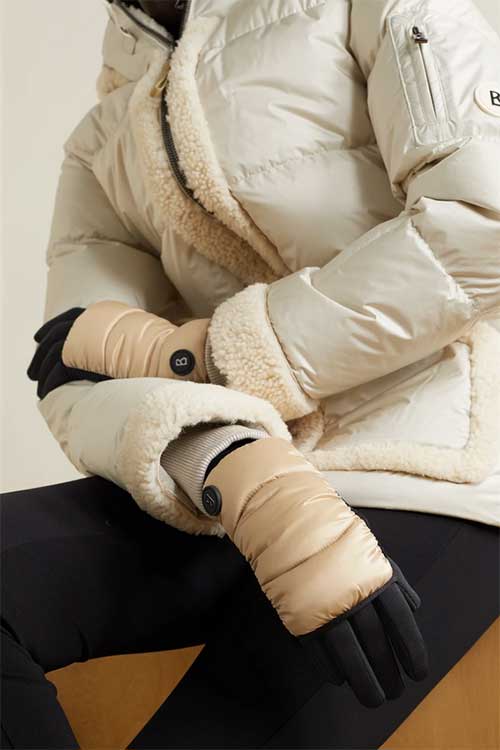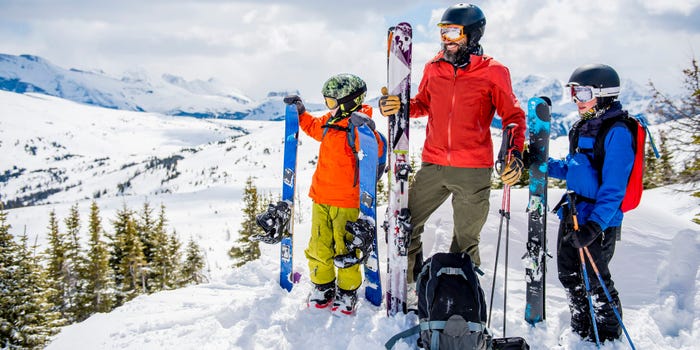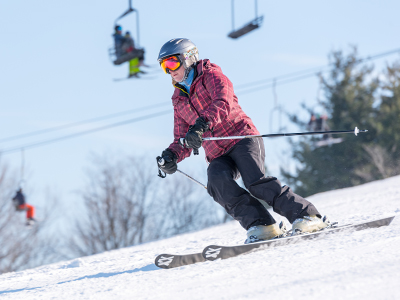
Cross-country skiing can be fun and low-impact for people of all ages. Cross-country skiing is an excellent way to stay fit, as they utilize all major muscle groups. It is easy to get started. Just make sure you have the right equipment.
The first thing to do is choose a ski and binding that fits your body. Ski poles and boots are also options, especially for beginners. Consider the terrain that you would like to ski on. It is best for beginners to begin on flat terrain.
Balance is the most important part about skiing. Balance is the key to controlling your body. This can be achieved by bending your knees, hips, and hips. This improves control and can prevent injuries.

Another thing to consider is what type of wax is being used for your crosscountry skis. There are different types of wax, from grip wax to glide wax. Glide wax is good for downhill skiing, while grip wax is for uphill skiing.
When selecting cross country skis, it is important to consider your skiing style. There are two main types: classic and skating. Classic cross-country skiing is done on a set of tracks that are groomed, while skate skiing is done on snow that has been tracked.
For beginners, you should get a pair that is both short and long. These skis will give you a better grip and help prevent you from getting hurt. A pair should be at least 5cm longer than your height. The skis should be at least 5cm longer if you are heavier.
Wear gloves that keep you warm. Warm socks are also recommended. If your feet are cold enough, blisters could occur. In addition, you should dress in layers. You should start by covering yourself with a light outer layer to protect you from the wind and then layer on a lighter, breathable inner layer.

Also, it is a smart decision to purchase a pair of quality ski poles. A quality pair of ski poles will be adjustable so you can change their length to fit your needs. You should keep your poles close enough to your body that they don't swing around.
You should also choose a pair of boots that is comfortable. Shoes that are too tight can cause blisters. Make sure they are well-insulated and allow for plenty of space for your toes. You can't get the best out of your cross country experience if you choose the wrong boots.
Also, make sure to bring a small pack of water and a teacup. Your legs will sweat, so you'll need breaks. You'll want to cool off after a tiring day.
FAQ
How much luggage should I take with me?
The length of your trip will determine how much luggage you need. If you are traveling by plane, you only need hand baggage, usually less than 20kg. If you are traveling by plane, you only need hand baggage, usually less than 20kg.
An airport form with information regarding your flight will be handed to you upon arrival. This will include information like the weight of your bag and whether you need assistance in checking them in.
You should always check this before leaving home. If you don’t check it, you might end up waiting hours for everyone else to do so.
Because you never know what could happen, it is better to travel light. For instance, if your bag is lost or stolen, you won’t have any clothes.
Where can I find cheap accommodation when traveling abroad?
Cheap accommodation options for travelers include hostels, hotels, guest houses, and bed & breakfasts.
Hostels offer affordable accommodation in dorm rooms with shared bathrooms and living areas.
Hotels are generally located in touristy areas.
Although they look similar to hostels in that they have smaller rooms and more people sharing each one, guesthouses can be quite different.
These bed & breakfasts are very popular with budget-conscious travellers. A guest stays in a private home and is provided with a full morning breakfast.
What documents should be kept handy while on the road?
Keep copies of important documents at home for easy access while on the road. You may also want to consider keeping copies of your passport, driver's license, and other official identification cards and any credit card information you might need if you plan to use an ATM machine.
It's always a good idea for you to have a photocopy with you of your passport in case you need it.
Also, don't forget to include copies of your itinerary and reservations. These will help keep you organized and allow you to plan your trip.
You should also keep a copy your hotel reservation and flight ticket details. You can contact your family back home easily if you are in trouble.
It's a good idea to never leave valuables unattended. Your valuables will be safe if you keep them in a money belt, or inside your luggage.
To avoid costly items being lost, make sure you check your luggage before you leave.
Remember that it is always safer to be simple than to plan everything.
Enjoy your journey and relax!
Should I get travel insurance?
Travel insurance is essential if you are planning on doing something adventurous. It's important that you are covered for all kinds of adventure sports.
If you plan on skiing, make sure that you have health insurance. It is also worth looking into coverage for theft, loss and damage.
Also, you should consider purchasing cancellation insurance. You can cancel your holiday without incurring any penalty.
It is also a good idea if you are able to get emergency evacuation cover. This covers being evacuated off the mountain in an emergency such as an avalanche.
Statistics
- Alcoholic beverages with more than 24% but not more than 70% alcohol are limited in checked bags to 5 liters (1.3 gallons) per passenger and must be in unopened retail packaging. (tsa.gov)
- Alcoholic beverages with 24% alcohol or less are not subject to limitations in checked bags. (tsa.gov)
- You can use compression sacs or cubes to reduce the volume of your clothes by up to 80%—this is especially convenient for bulky items such as sweaters and jackets. (eaglecreek.com)
- Between the ages of 11 and 13, kids, or tweens, will likely want some autonomy but also need boundaries. (travelandleisure.com)
- Case in point: the private island of Ilha Caldeira, less than seven miles off the coast as part of the Primeiras and Segundas Archipelago, is located within the marine-protected area with 20 percent of the country's intact living coral. (travelandleisure.com)
External Links
How To
What are the best travel tips for beginners?
Traveling is an exciting experience, but there are many pitfalls you need to avoid if you want to have a safe and enjoyable trip.
These are some basics to help you plan your next trip.
-
Book early. The price of a booking is lower if it's made in advance. By booking in advance, you can save money on hotels and flights.
-
Stay-at-budget accommodations. You get more for your money in cheap hotels. These hotels are often located close to shopping and public transportation.
-
Don't overpack. Keep it light. Leave room for souvenirs and gifts. Take clothes that fit well.
-
Be sensible. Do not walk alone if you're travelling solo. Avoid unsavory neighborhoods and areas where crime is rampant.
-
Prevent theft. Keep valuables locked away from sight. Swimming is a great way to keep valuables safe.
-
Take extra care when handling cash. Thieves often target tourists visiting foreign cities. Keep your money away from prying eyes and only use ATMs at banks or protected facilities.
-
Know what you're doing. You should know how to use public transport before you book a hotel. Get information on tourist attractions, restaurants and other sights.
-
Learn about safety. Before you travel, learn about the culture, laws, and customs of your destination.
-
Have fun. No matter what happens, enjoy yourself. It's well worth it.